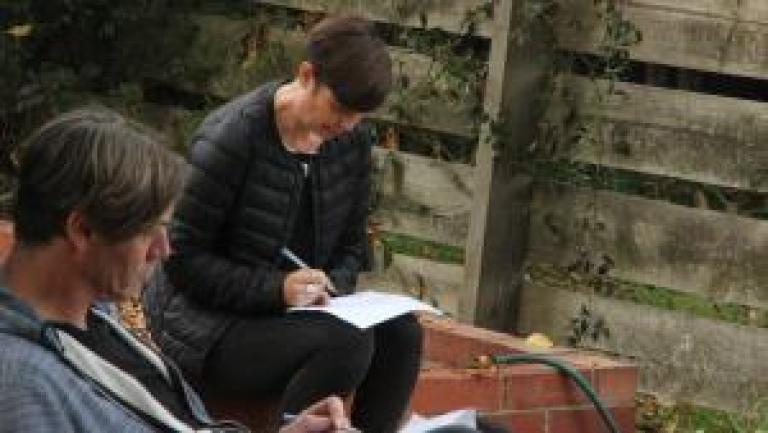Jean, a waitress at a café in Melbourne, couldn't help but notice the excessive and sometimes random use of plastic bags and takeaway cups by her customers. Determined to reduce the wastage and minimize its impact on the environment, she enrolled in the Sustainable Impact Mentoring (SIM) program run by Initiatives of Change Australia (IofCA).

The program places emphasis on designing sustainable solutions that are 'human-centred' in order to increase adoption and community impact. So Jean began to research the root of the problem, by talking to customers and observing their habits, to uncover why they sometimes had carry-bags or keep-cups and at other times they didn’t. She observed that if they had come to the café from their morning run they wouldn't have a bag or their keep-cup and would get a takeaway cup; if they had come from the office at 3pm they would. If they made unanticipated purchases, they would get a plastic bag. She asked people whether they preferred to purchase plastic bags. While many said they did not, they said they found it convenient when they forgot their shopping bags at home – which was quite often.
Through the program Jean created a ‘plastic-bag challenge‘ in order to help people change their behaviour and minimise situations where they were left without a bag or keep-cup. In the first couple of weeks, she surveyed participants in the challenge to find out what situations and behaviour led them to use plastic bags or takeaway cups. She then gave advice, ideas and inspiration on how they could minimise their chances of picking up plastic. Monitoring participants each week and reading where they had failed in the challenge gave her more useful insights into how reminders could be better targeted. Changes such as getting people to hang carrier bags on a hook near their front doors or keeping them on the dashboards of their cars (as people would forget them in the boot) were implemented.
Jean's was one of many initiatives that emerged from the SIM program that was launched as a pilot in 2017. The program was conceived by Gwendoline and Azain Raban who have been involved in the sustainability industry throughout their careers – Azain as a program officer at a humanitarian organization and Gwendoline at an environmental consultancy firm. In July 2016, they attended an IofC meeting in Switzerland, the Caux Dialogue on Land and Security, and were seized by a vision of empowering future leaders for sustainability. The couple partnered with IofC to ‘empower young leaders in the environment and sustainability fields who wish to create impact through innovative ideas and projects designed to meet community needs.’ This was the inception of the SIM program.
The SIM Approach: Human-Centred Design
The program aims to connect participants with experienced mentors in the environmental, sustainability and international development fields, and support them in developing impactful projects through Human-Centred Design (HCD). Often, well-intentioned problem solvers identify a problem and set out to formulate a solution that they think will fix it. However, after spending time and energy developing and implementing the idea, they find that there is no real need for that solution, or that the problem continues to persist and that people aren't using their solution. The HCD approach aims to bridge the gap between intended solutions and what people in local communities actually want and would use, taking into consideration our fallibilities and inconsistencies as human beings. HCD seeks to spend more time understanding the problem before jumping to solutions, allowing the designer to use a more empathic and intuitive process.

Participants of SIM are encouraged to come to the program with no solutions in mind but with a few areas they find interesting and would like to explore, such as renewable energy or composting. They form into groups based on their interests and are encouraged to have conversations with people in their local communities. They get to know about people’s lives by talking with them, observing their actual behaviour, putting themselves in their shoes and experiencing the problem for themselves.
They also factor into consideration how they felt when they spoke to their intended beneficiaries, as the HCD process relies not just on quantitative factors to arrive at a decision, but also on intuition, the sense of the group, and what they feel most connected with. HCD believes every human being has intuition, and promotes a holistic approach to solution finding. SIM Program Coordinator Kirsty Argento remarks, 'Often I'm surprised by people when they say there is this new avenue or approach that has come to our attention from talking to people, which we didn't think of earlier.'
All along the way, participants are supported by their mentors. They also take part in a series of workshops and reflective practices that help make the important connections between sustainable living, leadership and taking focused action in communities. In 2018 the program adopted and supported group projects instead of individual ones, as a way of mimicking the complexities and benefits of working in community to solve issues. Participants in the 2018 cycle of SIM will present their progress at the Armagh Sustainability Market on 8 September 2018 at the IofCA centre in Melbourne. The event is open to all. If you are interested in enrolling as a participant or in mentoring a participant in the 2019 program, come to this public showcase where you will meet participants and mentors. – Sudarshan Suresh
To express interest in the SIM program and join our mailing list please fill out your details here. For more details about the exhibition, getting involved or donating, please contact the Program Coordinator, Kirsty Argento.

